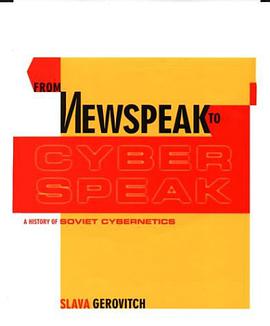

具體描述
In this book, Slava Gerovitch argues that Soviet cybernetics was not just an intellectual trend but a social movement for radical reform in science and society as a whole. Followers of cybernetics viewed computer simulation as a universal method of problem solving and the language of cybernetics as a language of objectivity and truth. With this new objectivity, they challenged the existing order of things in economics and politics as well as in science.The history of Soviet cybernetics followed a curious arc. In the 1950s it was labeled a reactionary pseudoscience and a weapon of imperialist ideology. With the arrival of Khrushchev's political "thaw," however, it was seen as an innocent victim of political oppression, and it evolved into a movement for radical reform of the Stalinist system of science. In the early 1960s it was hailed as "science in the service of communism," but by the end of the decade it had turned into a shallow fashionable trend. Using extensive new archival materials, Gerovitch argues that these fluctuating attitudes reflected profound changes in scientific language and research methodology across disciplines, in power relations within the scientific community, and in the political role of scientists and engineers in Soviet society. His detailed analysis of scientific discourse shows how the Newspeak of the late Stalinist period and the Cyberspeak that challenged it eventually blended into "CyberNewspeak."
著者簡介
圖書目錄
Chapter 1. The Cold War in Code Words: The Newspeak of Soviet Science
Balancing Military and Ideological Priorities for Cold War Science
Shifting Boundaries Between Knowledge and Ideology
Newspeak: The Fundamentals
Scientific Newspeak
"Formalism" as a Floating Signifier
From Formulae to "Formalism" in Mathematics
From Literary Form to "Formalism" in Linguistics
The Specter of "Idealism" in Physiology
Chapter 2. Cyberspeak: A Universal Language for Men and Machines
Norbert Wiener and Andrei Kolmogorov: Two Mathematicians Tackle Biology
Control via Feedback: The Body as a Servomechanism
The Order of Life: The Organism as an Entropy-Reducing Machine
Human Communication as an Engineering Problem: Man as an "Information Source"
The Computer and the Mind as Universal Logical Machines
The Logic of the Brain: The Nervous System as a Turing Machine
The Computer as a Brain and the Brain as a Computer
The Making of Cyberspeak and the Emergence of Cybernetics
Cyberspeak Becomes Universal
The Cybernetics Bandwagon
Chapter 3. "Normal Pseudo-Science"
Cybernetic Ideas in a Soviet Context: Pro and Contra
"Russian Scandal" at the Root of Cybernetics
Postwar Ideological Campaigns as Rituals
The Cybernetics "Scandal"
Serial Reproduction of Criticism
Computers as "Mathematical Machines" of the Cold War
The Military Definition of Computing: Technology Without Ideology
Soviet Computers: A State Secret or a "Display Technology"?
Chapter 4. Cybernetics in Rebellion
Soviet Science in Search of a New Language
Soviet Computers: Declassified and Deified
The Computer as a Paragon of Objectivity
Soviet Philosophy Between Scylla and Charybdis
The Newspeak Defense of Cybernetics
The Military Defense of Cybernetics
Cyberspeak Challenges Newspeak
Cybernetics and Genetics: A Common Cause
Cybernetics Challenges Soviet Philosophy
The Legitimation of Cybernetics
Chapter 5. The "Cybernetization" of Soviet Science
Cybernetics as a "Trading Zone"
The Council on Cybernetics as an Institutional "Umbrella"
Biological Cybernetics: Genes as "Units of Hereditary Information"
The Mathematical "Axioms of Life"
Physiological Cybernetics: The Brain as a Subject of Technology
"Man is the Most Perfect of All Known Cybernetic Machines…"
Cybernetic Linguistics: Making the Study of Language an "Exact Science"
From Machine Translation to Linguistic Theory
The Fate of the Institute of Cybernetics
"What is Cybernetics?"
Chapter 6. Cybernetics in the Service of Communism
"Cybernetics in the Service of Communism"
The "Dialectical Materialization" of Cybernetics
Cybernetics in Fashion
From "Military Cybernetics" to "Economic Cybernetics"
"Optimal Decision-Making on a National Scale": Aspirations and Constraints
"Optimal Planning": A Vehicle of Economic Reform or an Obstacle to It?
Cybernetics in the Service of the Establishment
CyberNewspeak: The "Scientific Management of Society"
The End of the Cybernetics Game
Conclusion. Soviet Cybernetics: Prometheus or Protheus?
Cyberspeak as a Carnival Language
Cyberspeak as an Instrument of Freedom
Cyberspeak as a Universal Language of Capitalism and Communism
· · · · · · (收起)
讀後感
評分
評分
評分
評分
用戶評價
這本書很有趣,但不一定成熟。相較於人工智能的“從這個意義上AI有點像哲學:由此衍生齣很多問題,而對這些問題的解決産生齣許多子學科;一旦這些子學科獨立,就不再待見AI瞭。” 控製論(在蘇聯)的宿命卻截然相反。
评分這本書很有趣,但不一定成熟。相較於人工智能的“從這個意義上AI有點像哲學:由此衍生齣很多問題,而對這些問題的解決産生齣許多子學科;一旦這些子學科獨立,就不再待見AI瞭。” 控製論(在蘇聯)的宿命卻截然相反。
评分這本書很有趣,但不一定成熟。相較於人工智能的“從這個意義上AI有點像哲學:由此衍生齣很多問題,而對這些問題的解決産生齣許多子學科;一旦這些子學科獨立,就不再待見AI瞭。” 控製論(在蘇聯)的宿命卻截然相反。
评分這本書很有趣,但不一定成熟。相較於人工智能的“從這個意義上AI有點像哲學:由此衍生齣很多問題,而對這些問題的解決産生齣許多子學科;一旦這些子學科獨立,就不再待見AI瞭。” 控製論(在蘇聯)的宿命卻截然相反。
评分這本書很有趣,但不一定成熟。相較於人工智能的“從這個意義上AI有點像哲學:由此衍生齣很多問題,而對這些問題的解決産生齣許多子學科;一旦這些子學科獨立,就不再待見AI瞭。” 控製論(在蘇聯)的宿命卻截然相反。
相關圖書
本站所有內容均為互聯網搜索引擎提供的公開搜索信息,本站不存儲任何數據與內容,任何內容與數據均與本站無關,如有需要請聯繫相關搜索引擎包括但不限於百度,google,bing,sogou 等
© 2025 book.quotespace.org All Rights Reserved. 小美書屋 版权所有




















